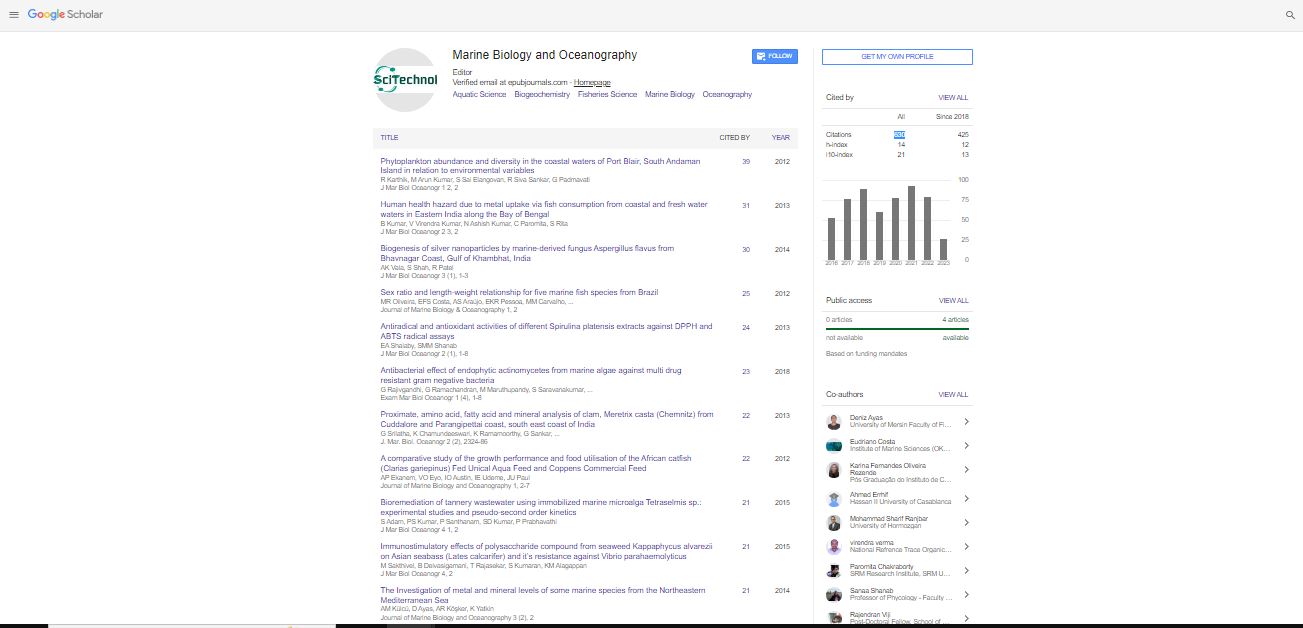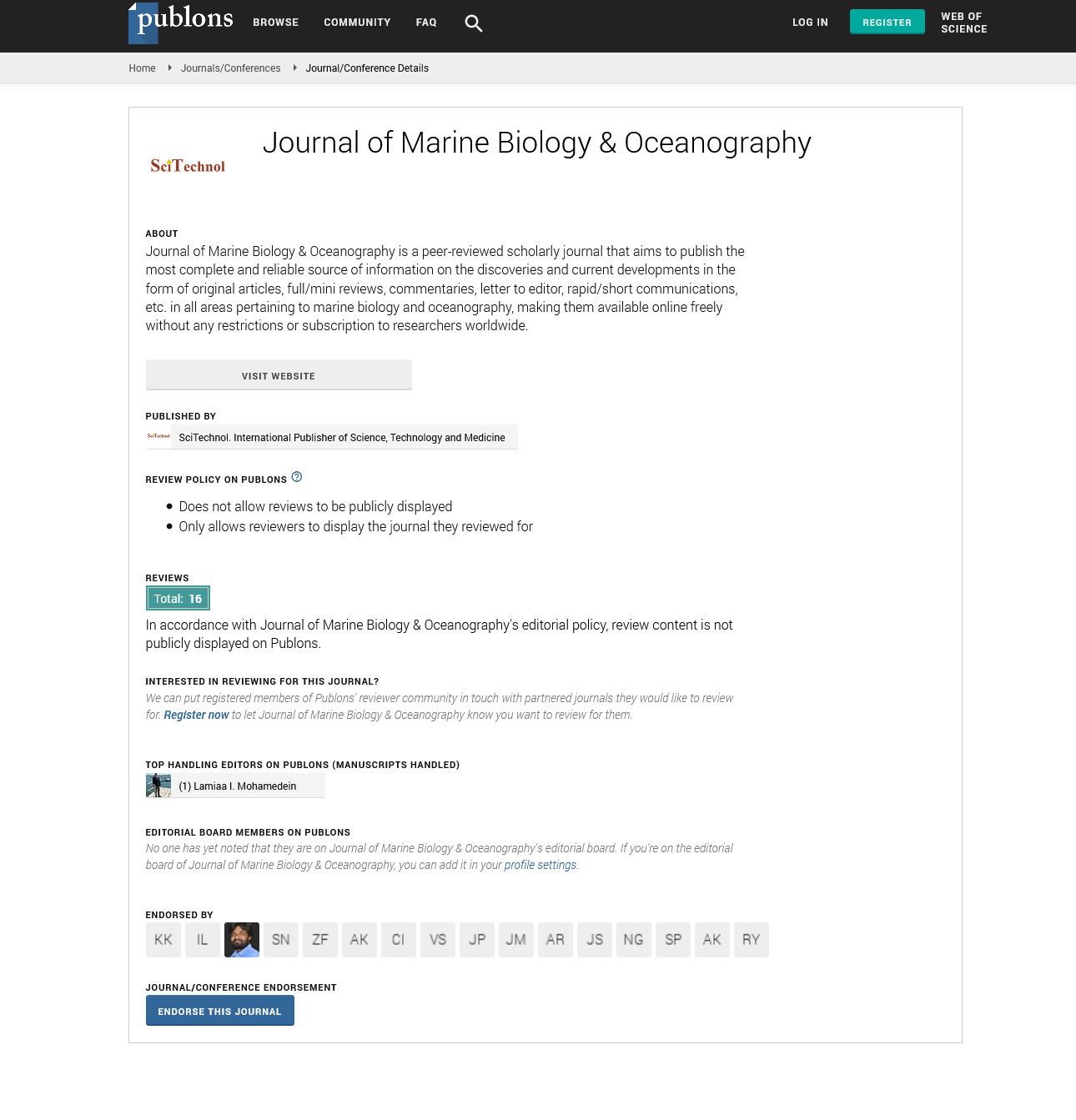Methane occurrence in sediments of the Gdansk Basin (Southern Baltic Sea)
Jerzy Bolalek, Aleksandra Brodecka-Goluch, Damian Jasniewicz and Zygmunt
Klusek
University of Gdansk, Poland
: J Mar Biol Oceanogr
Abstract
Introduction: Methane is regarded as an important gas not only from the economic but also environmental point of view. Geochemical results showed that methane in sediments of the Gdansk Basin is predominantly of the microbiological origin and the depth in sediments below which methane production takes place is relatively shallow (in some areas even 10-20 cm bsf). Methodology & Theoretical Orientation: Methane occurrence in marine sediments was determined during five research campaigns in the area of the Gdansk Basin during 2009-2017. Sediment cores were collected at 10 stations using a Rumohr Lot corer and a Niemisto-type corer. At each station, separate cores were taken for: 1) methane analysis 2) water content and loss on ignition 3) pore water extraction for the analyses of SO42-, TDS, NH4 + and DIC (or total alkalinity). Samples were analyzed based on headspace techniques on the gas chromatograph with FID detector. Pore waters were extracted using Rhizon samplers. Findings: It was found that methane is common in shallow sediments of the Gdansk Basin. It is predominantly of the microbiological origin and its production starts already at sediment depths of 10-20 cm bsf. Although methane concentrations in sediments are high, its values in near-bottom waters are relatively low, which point to effective methane oxidation processes that prevent the emission of this gas to surface waters and the atmosphere. Conclusion & Significance: Shallow sediments of coastal sea waters can be considered as methane production hot-spots and should be monitored in terms of methanogenesis zone depth, methane emission from the sea bottom (especially gas ebullition events) and the area of gas abundance in the bottom. Our research indicated the amount of methane in sediments of the Gdansk Basin decreased between 2009 and 2017, the depth of methane production increased, and the constant gas outflow finished. Figure1 Recent Publications 1. Radke B, Piketh S, Wasik A, Namieśnik J, Dembska G and Bolałek J (2013) Aspects of pollution in Gdansk and Gdynia harbours at the coastal zone of the South Baltic Sea. TransNav: International Journal on Marine Navigation and Safety of Sea Transportation 7(1):11-18. 2. Brodecka A, Majewski P, Bolałek J and Klusek Z (2013) Geochemical and acoustic evidence for the occurrence of methane in sediments of the Polish sector of the southern Baltic Sea. Oceanologia 55(4):951-978. 3. Reindl A, Bolałek J and Falkowska L (2013) Persistent organic pollutants (POPs) in the marine food web: herrings from the southern Baltic Sea (Clupea harengus) - penguins from the zoo (Spheniscus demersus). Oceanological and Hydrobiological Studies 42(1):51-58. 4. Ã…Âukawska-Matuszewska K, Kiełczewska J and Bolałek J (2014) Factors controlling spatial distributions and relationships of carbon, nitrogen, phosphorus and sulphur in sediments of the stratified and eutrophic Gulf of Gdansk. Continental Shelf Research 85:168-180.
Biography
Jerzy Bolalek is a Full Professor at the Gdansk University and Head of the Department of Marine Chemistry and Marine Environment Protection at the Faculty of Oceanography and Geography. He specializes in the field of chemical oceanography, hydrochemistry and environmental protection. The most important scientific achievements are: authorship or co-authorship of about 150 works, of which about 60 are original works published in English in international journals. He is also the author and co-author of a number of expert reports on the quality of marine waters as well as two Polish standards. He is a member of the Research Committee of the Polish Academy of Sciences and editorial committees of the Journal of Marine Science and Research since 2016 and Oceanological and Hydrobiological Studies. He also has extensive experience in assessing the quality of education at Polish universities
E-mail: ocejb@ug.edu.pl
 Spanish
Spanish  Chinese
Chinese  Russian
Russian  German
German  French
French  Japanese
Japanese  Portuguese
Portuguese  Hindi
Hindi 
